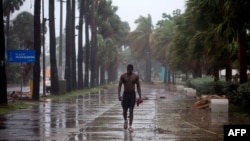Meteorologists say Tropical Storm Isaias could strengthen into a hurricane and threaten the East Coast of the U.S., after causing power outages and small landslides across Puerto Rico and the Dominican Republic.
The U.S. National Hurricane Center said late Thursday that Isaias is moving with maximum sustained winds of 95 kph.
The Associated Press reports that the storm’s powerful winds in Puerto Rico, still recovering from other hurricanes and earthquakes, has transformed “several streets into fast-flowing rivers and toppled trees and some telephone and electrical cables.”
More than 100,000 people are without fresh water.
According to AP, 14 percent of Puerto Rico’s cell towers are out.
Emergency workers had to rescue several families who were reluctant to leave their homes for public shelters because of fear of being exposed to the coronavirus at the shelters.
Isaias also blew down trees in the Dominican Republic. Police arrested surfers who refused to heed warnings to find shelter.
The U.S. National Hurricane Center has issued a tropical storm watch for parts of Florida’s east coast, and the government of the Bahamas issued a similar warning for swaths of its territory.
Other areas under a tropical storm watch or warning include parts of Haiti, the Dominican Republic and the Turks and Caicos Islands.
A tropical storm warning means that tropical storm conditions are expected somewhere within the warning area within 36 hours. A tropical storm watch means that tropical storm conditions are possible within the watch area, generally within 48 hours.
The latest forecast map shows Isaias striking the Florida coast as a hurricane Saturday afternoon and working its way up the Atlantic seaboard.
U.S. President Donald Trump has signed an emergency declaration for Puerto Rico, which has yet to fully recover from 2017’s Hurricane Maria and a recent series of earthquakes.
Isaias is the ninth named storm of a busy Atlantic hurricane season. This is the earliest date a storm beginning with the letter “I” has formed.
